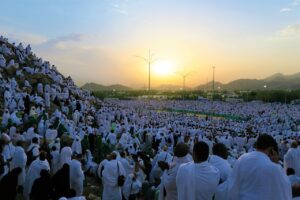Dhul Qadah, the 11th month in the Islamic calendar, holds great importance as one of the four sacred months ordained by Allah. These four months—Dhul Qadah, Dhul Hijjah, Muharram, and Rajab—are divine invitations for us to pause, reflect, and reconnect with Allah, our Creator and Sustainer.
As African American Muslims, our ancestors endured erasure of their spiritual traditions. Our faith during these months, and in every moment, offers a profound opportunity to reflect on the endless blessings of being Muslims and being able to freely practice Islam.
Significance of Dhul Qadah
The sacred month of Dhul Qadah carries profound spiritual significance, deeply rooted in its historical and theological importance. Inspired by figures like Bilal (RA), who transformed oppression into steadfast faith, this month encourages us to turn life’s challenges into spiritual strength through unwavering devotion.
Historically recognized as one of the four sacred months during which fighting is prohibited, Dhul Qadah also serves as a period of reflection and respite from bad habits such as gossip, neglect of prayer, ingratitude, and negative thoughts. It is a time dedicated to fostering peace and integrity within ourselves, making it an excellent opportunity to intensify our devotional practices.. Furthermore, this sacred month magnifies divine rewards. Our good deeds carry greater spiritual weight and become like seeds planted in fertile soil, yielding abundant spiritual growth through intentional worship and virtuous conduct.
Dhul Qadah is moreover a time of preparation for Hajj, which occurs in the next month in Dhul Hijjah. Therefore, now is an ideal time to finalize travel arrangements, learn Hajj rituals, and increase spiritual readiness.
Special Acts of Worship
- Increased Qur’an Recitation: Recite the Qur’an more frequently, following the Prophet’s ﷺ example.
- Voluntary Fasting: Fast on Mondays and Thursdays, and consider fasting on the 13th, 14th, and 15th of each month.
- Night Prayers (Qiyam al-Layl): Perform night prayers to strengthen your spiritual connection with Allah.
- Charity (Sadaqah): Give charity to those in need, as it’s a means of seeking forgiveness and rewards.
- Seeking Forgiveness (Istighfar): Reflect on your actions and seek forgiveness from Allah and others.
- Reconciliation and Peace-making: Strive to settle disputes and foster harmony within your community.
- Knowledge Acquisition: Attend Islamic lectures or study circles to deepen your understanding of the faith.
Historical Significance
- Treaty of Hudaibiyah: A pivotal event in Islamic history, the Treaty of Hudaibiyah, took place during Dhul Qadah, showcasing the power of peaceful negotiation and long-term vision.
- Compensatory Umrah: The Prophet (peace be upon him) and his companions performed Umrah in Dhul Qadah, demonstrating commitment to fulfilling obligations and maintaining peace.
May Allah bless us to emerge from these sacred months as renewed believers—united as a community, fortified in faith, and radiant with light of Allah. Ameen!






